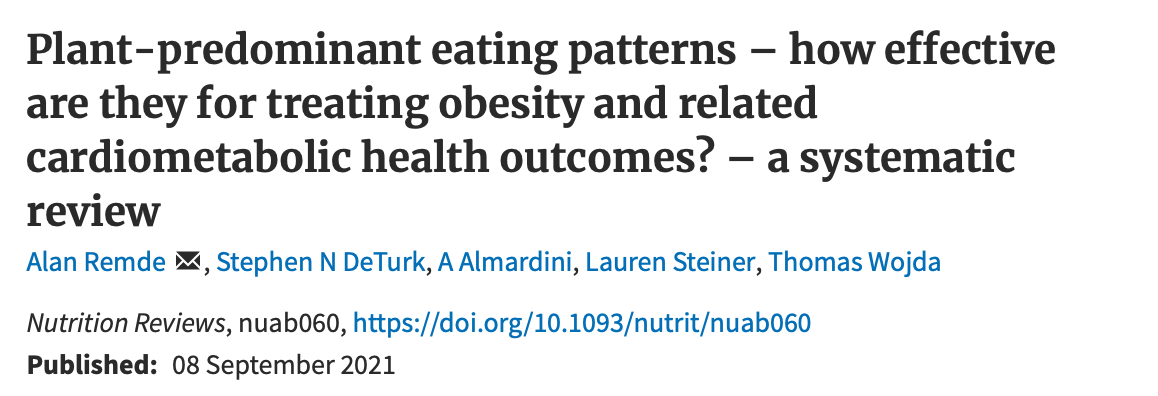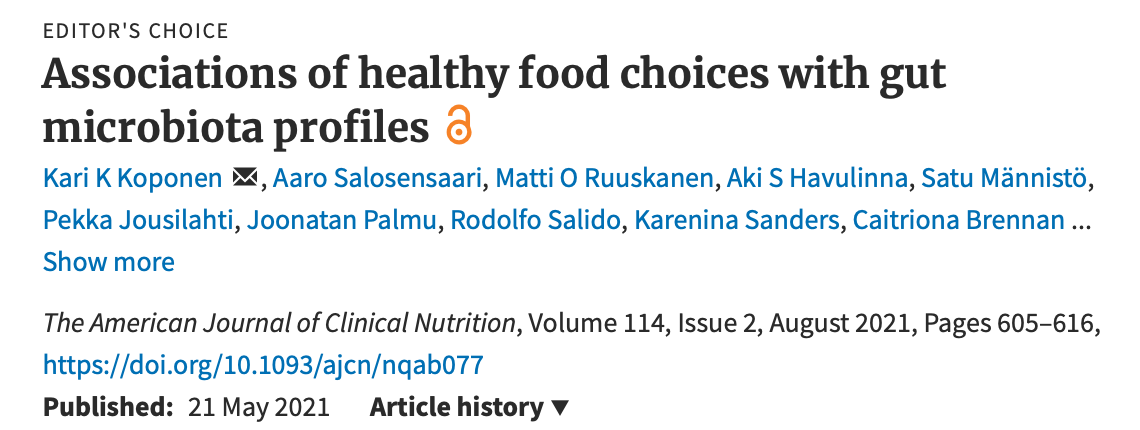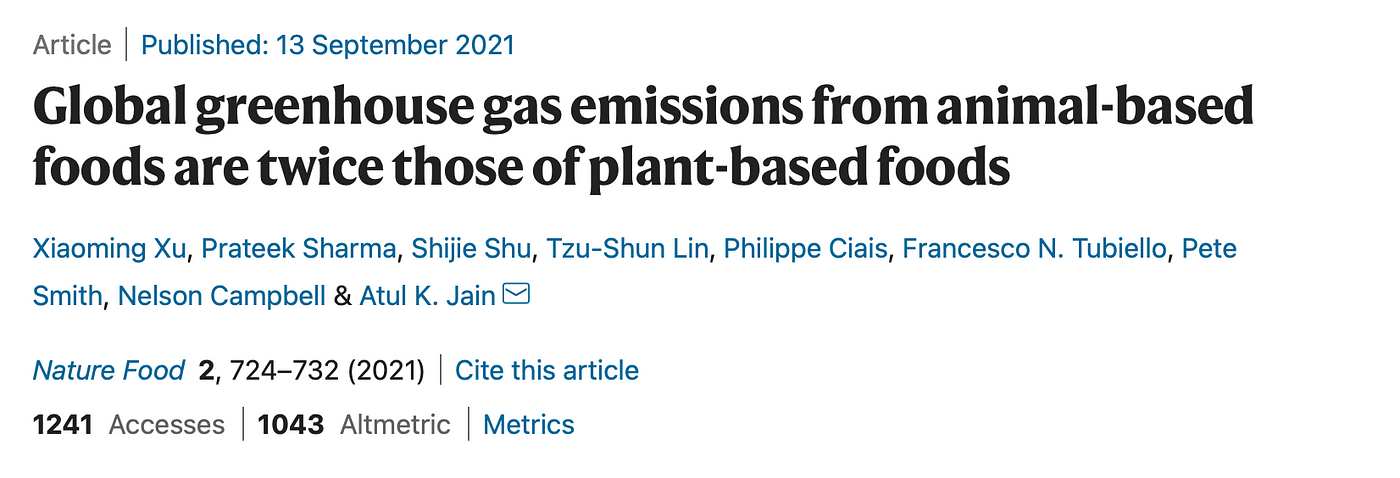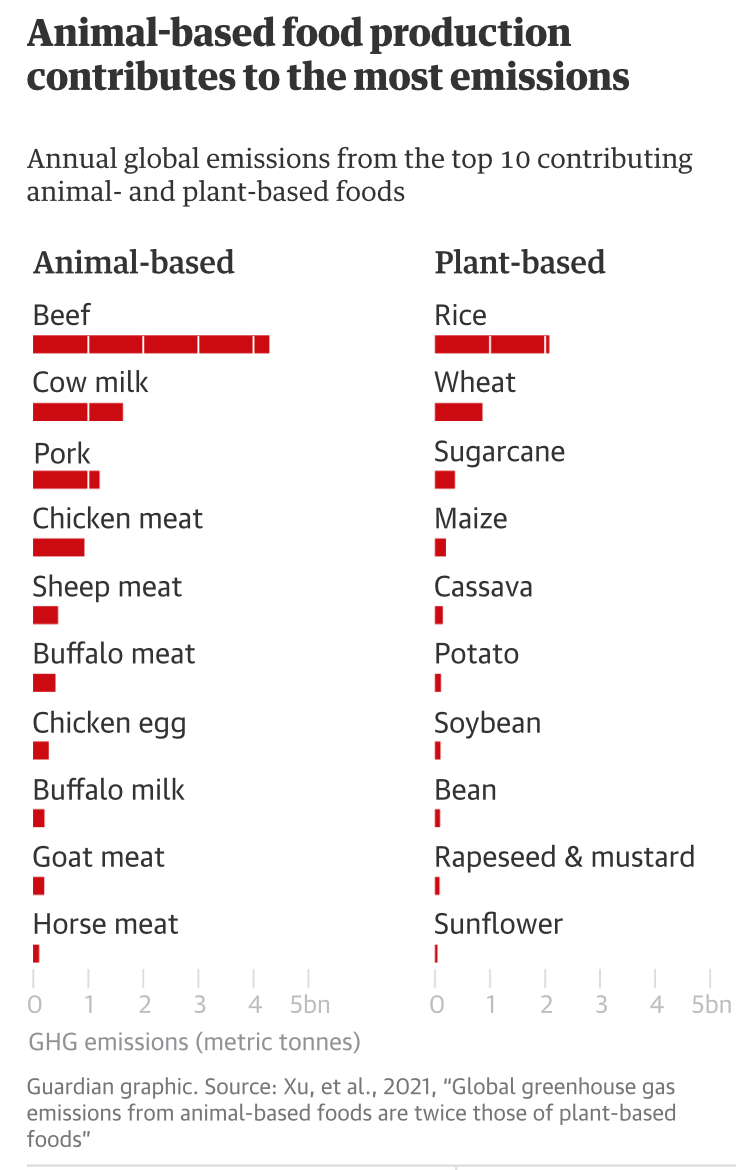A review of the week’s plant-based nutrition news 26th September 2021
This week I cover papers on plant-based diets for obesity and cardiometabolic health, the impact of foods, including plant-based meats, on the gut microbiome, health outcomes for people following a healthy vegan diet and the environmental impact of animal agriculture.

OBESITY AND CARDIOMETABOLIC HEALTH: This large systematic review includes 84 papers that investigate the efficacy of vegan, vegetarian and plant-based whole foods (PBWF — exclusively plant-based or minimal animal foods including eggs and dairy) diets in treating obesity, hyperlipidaemia, insulin resistance, glycaemic control, type 2 diabetes, cardiovascular disease and hypertension.
The paper reviews the impact of each of the three diet pattern on the various health outcomes listed above. Overall the findings confirm that all three types of diets reduce body weight to a greater extent than healthy omnivorous diets, including those recommended by the American Heart Association (AHA), American Diabetes Association and the National Cholesterol Education programme and in some studies performed better than the comparison calorie-restricted diet. Studies have also shown greater loss of subcutaneous, visceral and intramuscular fat with a plant-based diet. All three diets improve glucose control, insulin sensitivity and result in reductions in HbA1c in people with diabetes, with the ability to reverse diabetes in some. This has also been shown in the community setting amongst free-living people. Plant-based diets are very effective at lowering total and LDL-cholesterol but less effective for reducing triglyceride (TG) levels and may result in lower HDL-cholesterol levels. A Mediterranean diet is better at lower TG levels compared to vegetarian or vegan diets. Plant-based diets are also effective at lowering blood pressure but this may not be superior to other therapeutic healthy diet patterns, such as the DASH diet. A vegan diet has been shown to be more effective at lowering high sensitvity CRP (a marker of inflammation) compared to the AHA recommended diet in people with coronary artery disease. Studies by Dean Ornish have confirmed that a low-fat vegetarian diet has the potential to reverse coronary artery disease.
Overall, the differences between the three categories of plant-based diets were less important than the differences between the conventional comparator diet. Based on the results the authors conclude that recommendations in clinical practice should include a plant-based diet comprised mainly of whole plant foods. If animal foods are chosen to be included then this should be limited to fish and low fat dairy. White flour products, sugar-sweetened beverages and ‘poor-quality’ animal foods (factory farmed beef and chicken and processed meat) should be limited/avoided.
Accepting that there is a need for more high quality, randomised studies, the authors conclude that ‘All motivated patients with type 2 diabetes and cardiovascular disease should be informed of the potential reversibility or at least halting of progression of these illnesses with comprehensive lifestyle modification that includes plant-predominant eating patterns’.

HEALTHY FOODS AND THE GUT MICROBIOME: We are only now beginning to fully understand the important of the gut microbiome to our overall health. The trillions of micro-organisms that reside in our gastrointestinal tract have many essential functions including maintaining the gut barrier function, maintaining the health of the immune system, making bioactive compounds such as vitamins and hormones that communicate with distant organs such as the brain, lungs, skin and joints, metabolise bile acids and regulation of hunger and glucose control. Production of short chain fatty acids (SCFAs) from the fermentation of fibre is a crucial aspect of healthy gut bacteria. Diet and food choices are probably the most important predictor of gut health and to date we know the important components include fibre, polyphenols and probiotic foods.
The current study examined the associations between the gut microbiota and consumption of food items recommended to be part of a healthy diet in a large, Finnish, population-based cross-sectional study, including 4930 participants. The main objective was to assess whether healthy food choices are related to gut microbiota composition within samples (microbial diversity or alpha diversity) and between samples (compositional differences or beta diversity). Dietary information from participants was used to create a healthy food choices (HFC) score based on Nordic Nutrition Recommendations. Food items chosen to be components of the score were fibre-rich breads; vegetables (including beans and lentils); fruits; berries; fresh, non-sweetened berry and fruit juices; fish; poultry; low-fat cheeses; salad dressings and oils; and nuts and seeds. The HFC score effectively acts as an indicator for an omnivorous Nordic diet rich in plants, fibre, and PUFAs (polyunsaturated fatty acids).
The results showed that microbial diversity was associated with a high HFC score with positive associations with fibre-rich breads, followed by poultry, fruits, low-fat cheeses, and berries. Microbial composition was also positively associated with a higher HFC score with the most prominent associations observed for vegetables, followed by berries and fruits. Microbiota responsibility for producing SCFA’s were more abundant in participants with a higher HFC score. The foods that adversely affected the gut microbiome were processed and red meat.
There is no doubt that a fibre-rich plant-based diet is best for the health of the gut microbiome and this then supports the health of all the different organs of the body. Healthy vegetarian and vegan diets are consistently associated with better gut health and thus a key mechanism by which these diet patterns support good health and prevent chronic illness.

PLANT-BASED MEAT ALTERNATIVES (PBMAs): I certainly flip flop in my views about PBMAs. On the one hand I understand they make a great transition food for those new to a plant-based diet. On the other hand it just seems more of the same corporate control over our food system with investment channelled to products that are really not required given the abundance of healthy whole plant food options. Nonetheless, its good to consider their impact on health and whether they represent a healthier option that meat. We have had one small, short study, albeit well designed and conducted that demonstrated that Beyond meat products did have some health benefits when compared to grass-fed, organic beef. Participants in the SWAP-MEAT study had reductions in body weight, LDL-cholesterol and TMAO levels when on the Beyond meat part of the study compared to the beef part.
The current small study investigated the impact of PBMAs on the gut microbiome. Twenty participants were randomised to replace several meat-containing meals per week with meals cooked with PBMAs. Participants were requested to replace a minimum of 4 animal-protein based meals with a plant-based meal per week for four weeks. Stool samples were collected and compared to 20 participants that had not changed their usual animal-based diet. The PBMAs were donated from The Meatless Farm in Leeds, UK. Pea was the main source of protein in most of the products and they also had high levels of phenolic compounds such as lutein, ferulic acid and genistein.
Participants ended up swapping an average of 5 meals per week from animal containing ones to including PBMAs instead.The main finding from the stool analysis was a significant increase in the butyrate-production pathways with slightly more abundance of butyrate producing bacteria.
Butyrate is one of the SCFAs, along with acetate and propionate, produced by fermentation of fibre by certain gut microbes. Butyrate is particularly important as it is the main energy source of colonocytes. These SCFAs are important for glucose regulation, satiety signalling, immune system health, hormone and vitamin synthesis and more.
The authors conclude that although PBMAs are often considered a processed or ultraprocessed food, their impact on health may still be better than consuming meat and swapping some meals for PBMAs may not be detrimental and at the very least may support the health of the gut microbiome. Of course, there are a wide range of PBMAs with some made of more whole food ingredients, and hence better choices, than others. This article by Dr Matthew Nagra provides a details summary on the potential health impacts of PBMAs.

HEALTH STATUS OF ‘HEALTH CONSCIOUS’ VEGANS: We all know that describing a diet as vegan does not tell you what a person is eating but rather what they are not consuming. An unhealthy vegan diet composed of refined grains and ultraprocessed foods is just as unhealthy if not more so than an omnivorous diet. When studying the long-term health of vegans, it can be difficult to tease out the true health impact because of the differences in quality of the diet amongst participants. Therefore it is great to see a study that focuses on surrogate markers of health of vegans consuming a healthy plant-based diet.
This cross-sectional study conducted during a COVID-19 lockdown in Slovenia included 80 self-selected subjects (51 vegans, 67% females, and 29 non-vegans, 55% females). The average age of vegans was 46 years and non-vegans 57 years. Participants were invited through health/fitness coaches or sports and recreational groups, thus targeting people with a healthy, active lifestyle. Participants had the same diet pattern for more than 1 year and the vegans were mostly following this diet for health rather than ethical reasons. Dietary and lifestyle information was collected and correlated with data on blood lipids, blood pressure, body mass index (BMI) and body fat.
The results showed that vegans had a significantly lower BMI (22.8 vs 26.6) and body fat percentage (19.3 vs 25.8). Interestingly, vegans had a higher calorie intake than non-vegans and as would be expected a higher intake of carbohydrates, starches, fibre and polyunsaturated fatty acids with lower intakes of saturated fat and free sugar and no intake of cholesterol. In this cohort the vegans outperformed the non-vegans in terms of micronutrients intakes, including vitamins B12 and D, calcium, iron and zinc. Both groups had lower than recommended vitamin D intakes. The recommended calcium intake in Slovenia is 1200mg per day and both groups had lower intakes (vegans 979mg and non-vegans 826mg. Iodine intakes were also low in both groups (vegans 112mg non vegans 96mg). Interestingly, 67% of vegans and 47% of non-vegans were supplementing with long-chain omega-3 fatty acids (EPA/DHA). A third of each group were also consuming protein supplements. Non-vegans consumed more alcohol but still lower than average.
Regarding blood biomarkers, vegans had significantly lower total and LDL-cholesterol levels and triglycerides level but HDL-cholesterol did not differ between groups. The lower cholesterol levels were explained by higher fibre and lower saturated fat intakes. In addition both systolic and diastolic blood pressure were significantly lower in the vegan group.
Of course there a limitations to this small, cross-sectional study in which most of the data collected is self-reported. Nonetheless, it does support the notion that a well planned plant-based or vegan diet composed of minimally processed whole foods (i.e. a whole food plant-based diet) is nutritionally adequate when appropriate supplementation is included and has benefits for cardiometabolic health compared to a relatively healthy non-vegan diet.

GREENHOUSE GAS EMISSIONS (GHG) FROM ANIMAL AGRICULTURE: Yet another study confirming the negative impact of animal agriculture on climate health. This paper provides an extensive analysis of the production and consumption-related GHG emissions around the globe from plant and animal foods, assessing the whole of the supply chain (farm to fork). The researchers built a database that provided GHG emission data of 171 crops and 16 animal products from more than 200 countries.
Overall, food-related GHG emissions accounted for around 37% of total global emissions. The contribution of animal agriculture was found to be much greater than once thought and accounts for 57% of food system GHG emissions when all aspects of production and distribution are taken into account. The production of beef alone accounts for 25% of food-related emissions.
South America was found to be the region with the largest share of animal-based food emissions, followed by south and south-east Asia and then China. Food-related emissions have grown rapidly in China and India as increasing wealth and cultural changes have led more younger people in these countries to adopt meat-based diets.
Overall, GHG emissions from animal foods are twice that from plant foods. The main exception is rice, which is a source of methane when rice is grown in flooded paddies. There are ways of reducing methane production from rice, such as the System of Rice Intensification (SRI), but we can also help by eating a variety of grains rather than relying only on rice.

What was not calculated in the paper was the opportunity costs of lost carbon sequestration capacity of agricultural land that would otherwise revert to forest if allowed to return to its natural state. However, this paper from 2020 did just that. The study found that shifting to a vegan diet globally and releasing the land currently dedicated to producing food from animals back to nature would remove around ten years worth of fossil fuel emissions from the atmosphere, with the biggest gains would be made by high and middle-income countries.
I applaud that more than 200 medical journals have simultaneously published an editorial, ‘Call for emergency action to limit global temperature increases, restore biodiversity, and protect health’, calling Government and leaders to act now and also calling healthcare professionals to action ‘As health professionals, we must do all we can to aid the transition to a sustainable, fairer, resilient, and healthier world’. However, diet is only mentioned once, with no acknowledgment of the urgent need to transition to a plant-based food system. Without food system and diet change we can not meet climate targets. Diet change could reduce GHG emissions immediately without the need for new technologies and health professionals can and should play a key part in making this happen.
Please follow my organisation ‘plant-based health professionals UK’ on Instagram @plantbasedhealthprofessionals and facebook. You can support our work by joining as a member or making a donation via the website.
